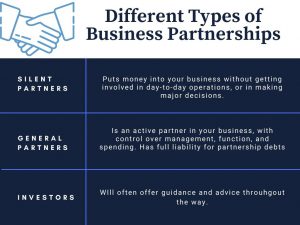If you’re the owner of a startup, you’ve probably heard the alarming statistics about startup failures: for example, around 82% of startups fail due to cash flow problems. So what can you do to avoid being another cash-flow casualty? Well, there’s the usual routes that involve loans, debt, and stepping up your sales, but have you thought about whether getting an infusion of cash from another source might be right for your business? You could look for investors, or you could consider taking on a silent partner, or someone who puts money into your business without having a say in the day-to-day operations. Cash without a say? Sounds too good to be true, right? So how does it really work?
Silent Partners, General Partners, & Investors
If the idea of bringing on a silent partner (or limited partner) sounds intriguing to you, you should first have an understanding of the differences between investors, general partners, and silent partners. Let’s take a look at these what these terms generally mean:
Silent Partners

Like other types of partners and investors, silent partners put money into your business in exchange for a share in it. Unlike other types of partners and investors, though, they do not get involved in day-to-day operations, or in making major decisions. They don’t attend meetings, oversee finances, or review strategies, instead they leave the daily work to the active partners in your business, and they trust that you will manage the business well.
Why would someone become a silent partner in your business? Well, they usually expect a pretty hefty return on their investment, usually more than what stocks, bonds, and mutual funds can offer. So they get to sit back and (hopefully) get a return on their investment, but their risk is comparatively low: they have limited liability, so silent partners are not liable for company losses beyond the percentage that they invested, meaning if they have a 10% stake in a business, for example, they would only be accountable for 10% of the incurred losses and debts. This limited liability also means that a silent investor’s personal assets would be safe if your business were to face financial difficulties.
And why would you choose to seek out a silent partner? If you simply want someone who gives you money, sits back, doesn’t get involved, and doesn’t have a say in what you do or how you do it.
General Partners
So then how is the above silent partnership arrangement different from having a general partner? Well, the major differences are that a general partner:
- Is an active partner in your business, with control over management, function, and spending.
- Has full liability for partnership debts, so if your business goes under, they could have their personal assets seized or liquidated to pay creditors and pay off corporate debts.
Having a general partnership is more for you if you’re looking for someone to help run your business with you.
Investors
Silent partners might sound closer to being an investor than an actual partner (especially when compared with a general partner), and that is true. In the case of many startups, though, investors often offer guidance and advice along the way, which silent partners don’t do. So if you’re just starting out, you might want to look out for investors who are willing to be a little more vocal – just be sure to look into how the Securities and Exchange Commission (SEC) classifies your arrangement, so you know how to avoid violations and penalties.
How to Find a Silent Partner
So if taking on a silent partner to get a cash infusion without losing any control over your business sounds like something that could keep your business growing, you’ll need to think about how to go about finding one. Consider the following steps:
- Have a solid, professional business plan in place that focuses on revenue projections. Remember, silent partners have no say in your business, so they’re not going to be excited by being part of your new business like other investors – they’ll mostly be focused on their return on investment, so show how you’re going to build up a positive cash flow relatively quickly.
- Talk to your friends and family, and see if anyone is interested in putting up some cash for your business. They know and trust you, and should have faith in your business and good intentions – just be sure to be clear with them that their money does not buy them any voting rights or other active role in your business, even informally.
- Look for angel investors, or wealthy individuals who fund projects during the early stages of development, who are often open to being silent partners as long as they see a potential for a return on investment. If you’re not sure how to find one, try an angel investor network, which specializes in connecting business operators with angels.
- Speak to businesses that are complementary to yours, or that offer things that are related to your business and that may be of use to your customers – they might be interested in helping your business get off the ground.
- Work on making your business as desirable as possible by securing investments, developing a revenue stream, or getting some positive media attention.
How to Bring on a Silent Partner the Right Way
When you’ve narrowed down who you’re going to make your pitch to, improve your odds of getting them on board by spelling out your business plan, including all realistic and quantifiable figures, and answer any questions your potential investors might have with a pitch that includes:
- Your concept
- Product or service samples
- Information about your existing competition
- Survey results
- Marketing plans
- Bios of your key personnel
- Budget information
- How much money you’re looking for
- What you’re offering in exchange for their help
And once you do find a silent partner, we need to come back to our point above about avoiding violations and penalties when it comes to business relationships; you need to know how to go about bringing on any type of investor in your business in a legal and beneficial way, including a silent partner.

Whoever you choose for your silent partner, you have to clearly define the terms of your partnership, and not just verbally – most states require partnerships to be formalized by legal documents that exactly outline the role of each partner in the organization. These agreements should clearly define the responsibilities and liabilities of each partner. Consider getting help from a securities attorney if you’ve got a silent partner with a big investment, so you can make sure you’re creating an arrangement that’s good for everyone involved, and that there’s no room for disputes or confusion about what everybody is on board with.
As long as you understand the risks and rewards of a silent partnership, and take all necessary steps to bring this type of investor on board the right way, you could end up with a relatively low-stress way to bring cash into your business, and keep it growing. So what do you think? Would you prefer an investor who can guide and advise you, or one who offers up the money, then steps back and lets you take full control?
